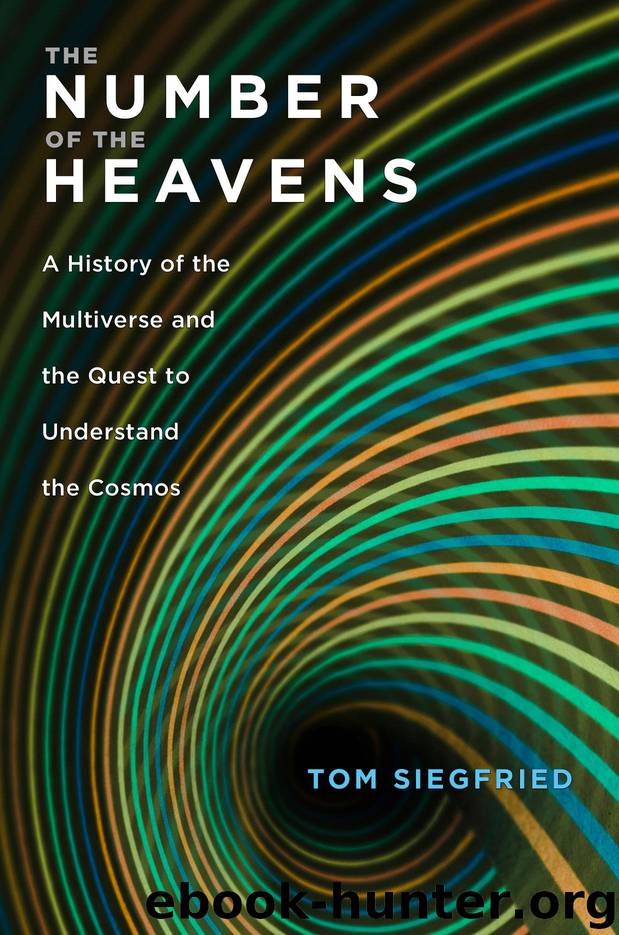The Number of the Heavens by Tom Siegfried

Author:Tom Siegfried
Language: eng
Format: epub
Publisher: Harvard University Press
10
E Pluribus Universe
Whether true or false, the hypothesis of external galaxies is certainly a sublime and magnificent one. Instead of a single star-system it presents us with thousands of them.… Our conclusions in science must be based on evidence, and not on sentiment. But we may express the hope that this sublime conception may stand the test of further examination.
—A. C. D. CROMMELIN, 1917
EDWIN HUBBLE really did deserve to have a telescope named for him.
Before Hubble, astronomers operated mostly within a limited horizon. Their prime occupation was studying the stars in the Milky Way. Many astronomers believed, much like Kepler, that the space beyond our galaxy was above their pay grade, not a proper subject for science.
“Astronomers in the late 19th century and the very start of the 20th century were very little interested in what we would call the broader universe or its history,” says historian of science Robert Smith. “As far as almost all astronomers were concerned, the universe beyond our own limited system of stars was the realm of metaphysics, and working astronomers did not engage in metaphysics.”
Other scholars, though, still wondered about the grander cosmos—which was fine with the astronomers. “The infinite universe beyond our stellar system was territory that professional astronomers really were very happy to leave to mathematicians, physicists, philosophers and some popularizers,” says Smith.1
But Hubble changed all that. He broadened the scope of professional astronomy to encompass the universe as a whole. In the process he revealed a universe vast and dynamic, exceeding the visions of the cosmos imagined by the astronomers of the past. Hubble opened the way to the modern understanding of the expanding, Big Bang–initiated universe that remains essentially the accepted view even today. And the key step in paving the way to comprehending today’s cosmos was his validation of the existence of island universes. That led modern cosmologists to redefine the universe as the space containing all those islands. Like a single country comprising many states—E Pluribus Unum—the cosmos became a confederation of galaxies. E Pluribus Universe.
Download
This site does not store any files on its server. We only index and link to content provided by other sites. Please contact the content providers to delete copyright contents if any and email us, we'll remove relevant links or contents immediately.
| Aeronautics & Astronautics | Astronomy |
| Astrophysics & Space Science | Comets, Meteors & Asteroids |
| Cosmology | Mars |
| Solar System | Star-Gazing |
| Telescopes | UFOs |
Tools of Titans by Timothy Ferriss(8345)
Turbulence by E. J. Noyes(8001)
Secrets of Antigravity Propulsion: Tesla, UFOs, and Classified Aerospace Technology by Ph.D. Paul A. Laviolette(5356)
Astrophysics for People in a Hurry by Neil DeGrasse Tyson(5168)
Room 212 by Kate Stewart(5087)
Design of Trajectory Optimization Approach for Space Maneuver Vehicle Skip Entry Problems by Runqi Chai & Al Savvaris & Antonios Tsourdos & Senchun Chai(5051)
Pale Blue Dot by Carl Sagan(4981)
The David Icke Guide to the Global Conspiracy (and how to end it) by David Icke(4680)
A Journey Through Divination and Astronomy by Publishing Pottermore(4369)
Goodbye Paradise(3790)
Apollo 8 by Jeffrey Kluger(3687)
COSMOS by Carl Sagan(3601)
The Five People You Meet in Heaven by Mitch Albom(3544)
Losing the Nobel Prize by Brian Keating(3526)
How to Read Water: Clues and Patterns from Puddles to the Sea (Natural Navigation) by Tristan Gooley(3443)
Brief Answers to the Big Questions by Stephen Hawking(3407)
How to Read Nature by Tristan Gooley(3311)
The Order of Time by Carlo Rovelli(3172)
A Brief History of Time by Stephen Hawking(3006)
